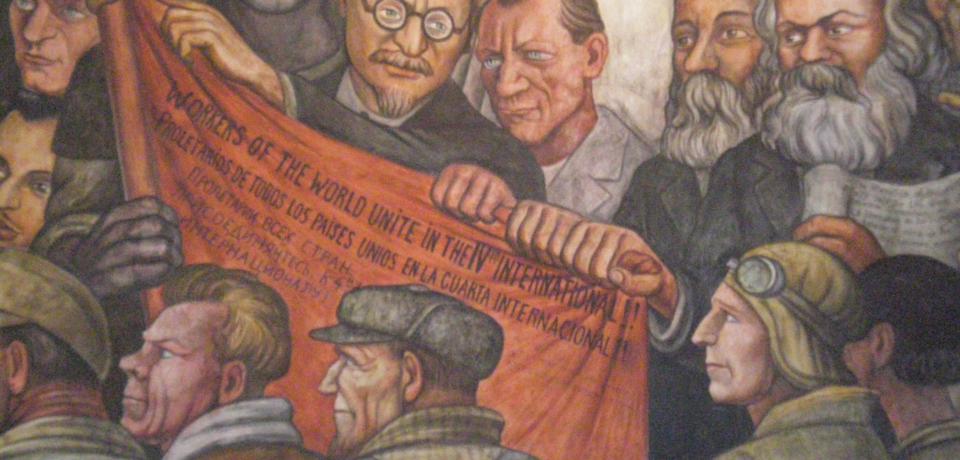Dave Kellaway examines the arguments for eco socialists to be part of a revolutionary international
‘I mean you guys have less than a thousand members in most countries and you want to build an International? Esperanto has more chance becoming an international language than you lot building an International with any relevance.’
How often have revolutionary Marxists heard this retort? Mind you the same objection is often made to attempts to building a revolutionary socialist party just in one nation. Members of Anti*Capitalist Resistance are meeting in the New Year to decide whether to fully join up to the Fourth International. So what is the point of building a revolutionary International?
- An International is the historical legacy of our movement
Marx himself set up the First International, if you read the Communist Manifesto it is written as a draft programme for an international party – the Communist League, precursor of the International – for its Congress in 1848. Already in that year it was translated into a number of European languages. It was never a document for one nation. Given that at that time capitalism was at quite an early state of globalisation it is remarkable how far sighted Marx and Engels were. Since then capitalism has come to dominate the planet, even recapturing societies like the Soviet Union that had begun a transition to socialism to its rule. If capitalism is a global system since corporate investment and imperialism knows no borders then workers of all the world have to unite. The Manifesto ends with that slogan. It states that workers have a ‘world to win’. The chains of nationalism had to be broken.
Lenin, Trotsky and Rosa Luxembourg broke from the Second International over the capitulation of the German Social Democrats and their co-thinkers elsewhere to their own bourgeoisie’s support for the inter-imperialist First World War. At that time the revolutionary internationalist position was a very small minority. However the victory of the Russian Revolution and its impact among workers and peasants worldwide enabled Lenin and Trotsky to set up the Third International. This functioned as a revolutionary force for change with its parties having a real mass base. It did not get everything right, but if you read the documents of the first four congresses there are rich debates about revolutionary tactics and strategy that still have some relevance today.
Stalin’s rise to power in the Soviet Union and the physical repression of Trotsky, the Left Opposition and any other challenge to his rule resulted in the destruction of the democratic Third International. Thereafter Stalin set up the Comintern which was totally controlled from Moscow and defended the interests of the bureaucratic dictatorship rather than those of the international working class.
In the Spanish Civil war, for example, the Comintern’s role included dividing the anti-Franco forces. Independent revolutionary parties like the POUM were repressed. Its leader, Andres Nin, and other fighters, were murdered by Stalin’s agents. Trotsky, before his assassination by a Stalinist operative, set up the Fourth International in 1938 with the few revolutionary currents which were both anti-Stalinist, anti-capitalist and anti-imperialist.
2. Ecological crises make international organisation even more relevant today
Over the last few decades we have become increasingly aware that capitalism does not just exploit the majority of people for profit but threatens all human, animal and plant life because of its never-ending need to grow and exploit the natural world. Marxists, revolutionaries and eco activists are more and more seeing themselves in practice as ecosocialists. Pollution does not recognise borders. Extractive and fossil fuel companies operate indiscriminately throughout the globe.
Such an eco-socialist international is a change from the one that Marx, Lenin, Luxembourg, Trotsky envisaged. Even the new post-1968 New Left was slow to see the importance of the ecological struggle. A new revolutionary international does not just aim for working people to own and control the means of production. We also need an ecological plan to remodel production in harmony with Mother Earth. The bureaucratic dictatorship in the former Soviet Union polluted and destroyed nature just as much as the capitalists in the west. For example industrialised cotton farming destroyed the Aral Sea.
A revolutionary international today has to interrogate traditional notions of growth and abundance put forward by our movement. So the need for a revolutionary International does not just depend on some sort of ritualistic bow to our Marxist or Leninist forebears. It has to respond to today’s conditions and how they affect workers and peasants.
3. Forming internationalists
Building international parties helps to break down ingrained nationalist/imperialist reflexes that can even affect Marxist radicals who proclaim themselves internationalists. Centuries of empire, colonialism and imperialism will leave deep ideological and psychological traces, just as sexist behaviour can persist among radicals. Actively building an international party can lesson these risks.
It is interesting how the experience of some currents building internationals can replicate this ideology as the strongest section with funds that support the smaller groups becomes the motherboard of these currents. The self-designated centre essentially decides the political line at all times, intervening in its satellite groups if they go off message. Getting real input and balanced leadership that includes the global south is difficult although the extension of new technology can help.
Class struggle parties emerged to the left of reformism such as Syriza (Greece) or Podemos (Spain) in recent decades. They were not part of an international current and therefore more likely to succumb to pressures to join ‘national unity’ governments. Look at the Bündnis Sahra Wagenknecht (BSW) in Gemany, led by Sahra Wageneckt, which split from Die Linke on a nationalist, anti-migrant line.
Groups and individuals who are inside revolutionary international currents can also do the same – this happened in Brazil and Sri Lanka with the Fourth International (FI) in the past. However by establishing structures and education that consciously operates to develop an internationalist culture you can try and minimise such losses.
4. Do you need a major breakthrough in one country first before building an International?
Some people on the left may accept the need for an international abstractly but say it is premature to set one up now or to give it too much priority. Don’t we have to concentrate on making an anti-capitalist breakthrough in one country which can then provide a resource and a model for revolutionaries everywhere? Look at how the victory of the Russian revolution really boosted the structures of the Third International. The period covering the first four congresses of the Third International was the only time we saw mass parties structured in an International.
Isaac Deutscher, the great biographer of Trotsky, argued it was premature to set up the Fourth International in 1938. But it is difficult to argue that it was any easier after the Second World War when Stalinist parties became stronger given the role of the Soviet Union in fighting Hitler and the CPs in the resistance movements.
Once you recognise that the revolutionary continuity is fatally broken you have to start again as Lenin did in 1914 with meagre support. The fact that some continuity through the Fourth International was maintained through to the post-1968 New Left meant that that generation was able to have access to an anti-Stalinist, revolutionary tradition going back to classical Marxism.
This argument is a bit like people saying in a national context that it is premature to set up a revolutionary organisation before there is a class struggle mass movement and a higher consciousness among masses of workers. The problem here is that you cannot leave it all to the last minute. Revolutionary crises will not provide the basis for a revolution if you have not achieved a specific weight of revolutionary cadre who can provide leadership to take the revolution forward.
How many times have we seen mass upsurges shake bourgeois states only to evaporate due to a lack of a conscious vanguard? It is also true that we should not get ahead of ourselves and have small groups proclaim that we already are the revolutionary nucleus and people should just join us.
5. Why an International is useful for revolutionary activists
It is useful both for political discussion and for taking action that has a political impact. Revolutionary consciousness benefits from regular structured debate with others throughout the world. A functioning international provides that training, the opportunities to regularly talk and discuss. Debates documented inside the FI on women’s liberation, socialist democracy and ecosocialism have often been useful for wide layers of activists. Sometimes these issues were taken up before they became more mainstream in the wider movement. Books and publications sponsored by the IIRE (International Institute for Research and Education) and International Viewpoint/Inprecor help diffuse these ideas.
International structures are not just about generating political analysis or even communiques on the issues of the moment but can help coordinate actions internationally. The FI was rebuilt partly through its solidarity with the liberation movements in Cuba, Algeria and Vietnam. Later it made huge efforts to build solidarity with Nicaragua (in its radical phase), Solidarnosc in Poland and the 1982 British miners strike to just cite a few examples. Today comrades in Italy are at the centre of solidarity with the GKN factory occupation/cooperative. We have organised international meetings to share the experiences of organising in solidarity with the Palestinian people.
An international can quickly disseminate practical information about certain struggles. Tours of comrades involved in exemplary battles can be set up in a number of countries. Another useful activity is to bring together young activists in an annual youth camp that has a different country as the venue each year. Groups or individuals from the global south can be subsidized to a degree by sections in the more advanced capitalist countries. This applies also to the international educational schools that are run in Amsterdam with its dedicated base. These schools are open to activists who are not members of the FI.
We can benefit too from sharing articles written by comrades across the world and published in the International Viewpoint website. One thing that can be very irritating is when people from Britain pontificate about events in other places without giving voice to the activists in those countries. For example some people on the left here reduce the invasion and occupation of Ukraine to an inter-imperialist conflict provoked by US pressure on Russia. Contacts with sympathisers inside Ukraine allow us to counter such simplistic analyses and restore agency to Ukrainians.
With a functioning international structure, you can build a political culture that starts from understanding the conditions and interests of workers and peasants in different countries first hand. This is particularly important given the influence of campist sentiments today on the left. For campists revolutionary action is mainly determined by the conflict between the imperialist powers. If the main and only task is to weaken US interests that the needs and interests of workers in countries on the wrong side of this divide are sacrificed. So some left wing people defended Assad as a lesser evil since the US was attacking him. Russian bombing and war crimes there were downplayed or ignored because Putin was supporting a regime that supposedly was part of an axis of resistance against the US and Israel. They see the overthrow of Assad as a massive defeat for workers.
6. An International that does not sound or look weird
Listening to Aaron Bastani on Novara media’s review of the year (well worth watching) I was impressed by his final comment about the need for the left to build an anti-capitalist current that is not ‘weird’. I think he is absolutely right about the need for the left to be accessible and approachable for people outside the left bubble. This applies to our championing of the need for an International.
The first maxim must be: do not pretend to be the world party of the international proletariat, particularly do not proclaim this on your publications. Talk like that puts you in the weirdo camp.
We must accept where we are. While we say we must not put off building an International today we see ourselves as a possible component of a much bigger one. Regrouping with currents coming from within or outside the Trotskyist tradition is essential. Indeed officially the FI does not define itself as Trotskyist and there are sections that come from Maoist or other traditions.
In Britain both the Socialist Party with the CWI (Committee for a Workers International) and the SWP with the IST (International Socialist Tendency) organises with its co-thinkers internationally. Neither is as present internationally as the FI or as structured, but we do not rule out working towards a convergence with such currents.
An international has to reject any pseudo Leninist idea that some sort of centre has to determine the political line to take in each country. Each section has to determine its own strategy and tactics. It is only when a section in a country decides to cross class lines by for example joining a bourgeois government or breaking a strike that the International leadership would take action repudiating it. Just to give an example of democratic functioning today in the FI. There are nuances today on the line to take on Ukraine. While all groups call for the withdrawal of Russian troops not everybody agrees with Ukraine getting arms from Western governments. Publications of the International reflect that pluralism while making clear when positions are actually taken by international bodies.
Finally we should also keep in mind another reason for international organisation. The far right are organised internationally and they have a lot more resources than we do. Steve Bannon and others are always organising international meetings and funnelling money from their rich backers to groups around the world. Money from Putin’s Russia also finds its way into the coffers of the far right. The left should organise on an international level, whether this is us as revolutionary ecosocialists or broader mass organisations like trade unions or Labour parties.




